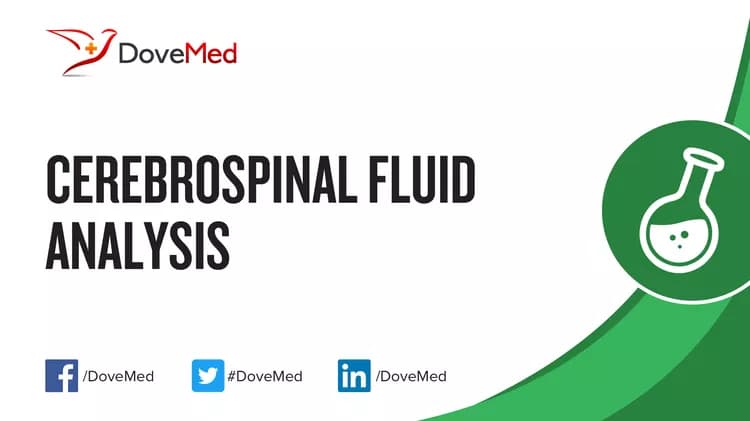What are the other Names for this Test? (Equivalent Terms)
- CSF Analysis
What is Cerebrospinal Fluid Analysis Test? (Background Information)
- Cerebrospinal fluid (CSF) is a protective fluid released by the choroid plexus of the brain. It circulates through the ventricular system of the brain and spinal cord
- The cerebrospinal fluid has two protective roles:
- To act as a cushion to shield the brain and spinal cord from physical trauma
- To form a medium that confers chemical stability and isolates the brain from potentially damaging substances, such as drugs and metabolic wastes
- Due to the close relationship CSF has with the brain and spinal cord, an analysis of the fluid may yield valuable information regarding the health of these structures
- CSF is most often obtained through a procedure, known as a lumbar puncture, or spinal tap. However, it can also be obtained through a ventricular or cisternal puncture. Obtaining CSF may be more difficult than obtaining blood or other body fluids. However, cerebrospinal fluid provides valuable information, unavailable through other means
- The Cerebrospinal Fluid Analysis assesses the chemical makeup of CSF, to infer information about the health of the brain and spinal cord. It can be used to diagnose cancer, infection, bleeding, autoimmune diseases, and a host of other ailments
- A CSF Analysis may involve individual tests of CSF, such as color, protein, glucose, cell count, Gram stain, and/or culture
What are the Clinical Indications for performing the Cerebrospinal Fluid Analysis Test?
Following are the clinical indications for performing a Cerebrospinal Fluid Analysis:
- Recent, severe trauma to the head (causing intracranial hemorrhage)
- Monitoring progress of chemotherapy
- Monitoring progress of a known cancer, infection, or other disorders
- Fever, headache
- Excessive vomiting
- Seizures (convulsions)
- Altered mental status
- Numbness of extremities
- Sudden trouble speaking or understanding
- Prolonged infection
- Paleness and fatigue
How is the Specimen Collected for Cerebrospinal Fluid Analysis?
Following is the specimen collection process for Cerebrospinal Fluid Analysis:
Sample required: Cerebrospinal fluid
Process: Insertion of a needle into the lower back or skull
Preparation required: No special preparation is needed prior to the test.
What is the Significance of the Cerebrospinal Fluid Analysis Result?
The significance of Cerebrospinal Fluid Analysis is explained:
- Increased cerebrospinal fluid pressure may indicate:
- Tumors, such as primary tumors of brain, metastatic carcinomas to the brain, and lymphomas
- Infection of brain and meninges
- Hydrocephalus (fluid accumulation in the brain ventricles)
- Bleeding (intracranial hemorrhage)
- Decreased cerebrospinal fluid pressure may indicate:
- Dehydration
- Shock
- CSF leakage
- Cloudy, discolored, or abnormally viscous CSF may indicate:
- Bleeding (intracranial hemorrhage)
- Presence of bilirubin
- Infection
- Increased protein levels, due to a variety of causes
- Cancer
- Meningitis (infection of the meninges)
- Encephalitis (infection of the brain)
- Increased glucose or lactic acid may indicate:
- Meningitis (infection of the meninges)
- Tumor, such as primary tumors of brain, metastatic carcinomas to the brain, and lymphomas
- Multiple sclerosis
- Guillain-Barre syndrome
- Syphilis
- Increased immunoglobulin G (IgG) may indicate:
- Multiple sclerosis
- Herpes encephalitis
- Connective tissue disorder
- Increased white blood cell count may indicate:
- CSF infarct
- Metastatic tumor in contact with CSF
- Multiple sclerosis
- Infection
- Increased glutamine may indicate:
- Liver disorder
- Reye’s syndrome
- Increased lactate dehydrogenase may indicate:
- Bacterial meningitis as opposed to viral meningitis
- Leukemia (both acute and chronic leukemias)
- Stroke
- Positive culture tests may indicate microbial infections
The laboratory test results are NOT to be interpreted as results of a "stand-alone" test. The test results have to be interpreted after correlating with suitable clinical findings and additional supplemental tests/information. Your healthcare providers will explain the meaning of your tests results, based on the overall clinical scenario.
Additional and Relevant Useful Information:
- The cerebrospinal fluid should not be mistaken for forming the blood-brain barrier. The blood-brain barrier is formed by a series of tightly interwoven capillaries. In fact, substances that make it to the CSF often have free access to the brain
Certain medications that you may be currently taking may influence the outcome of the test. Hence, it is important to inform your healthcare provider, the complete list of medications (including any herbal supplements) you are currently taking. This will help the healthcare provider interpret your test results more accurately and avoid unnecessary chances of a misdiagnosis.
Related Articles
Test Your Knowledge
Asked by users
Related Centers
Related Specialties
Related Physicians
Related Procedures
Related Resources
Join DoveHubs
and connect with fellow professionals


0 Comments
Please log in to post a comment.